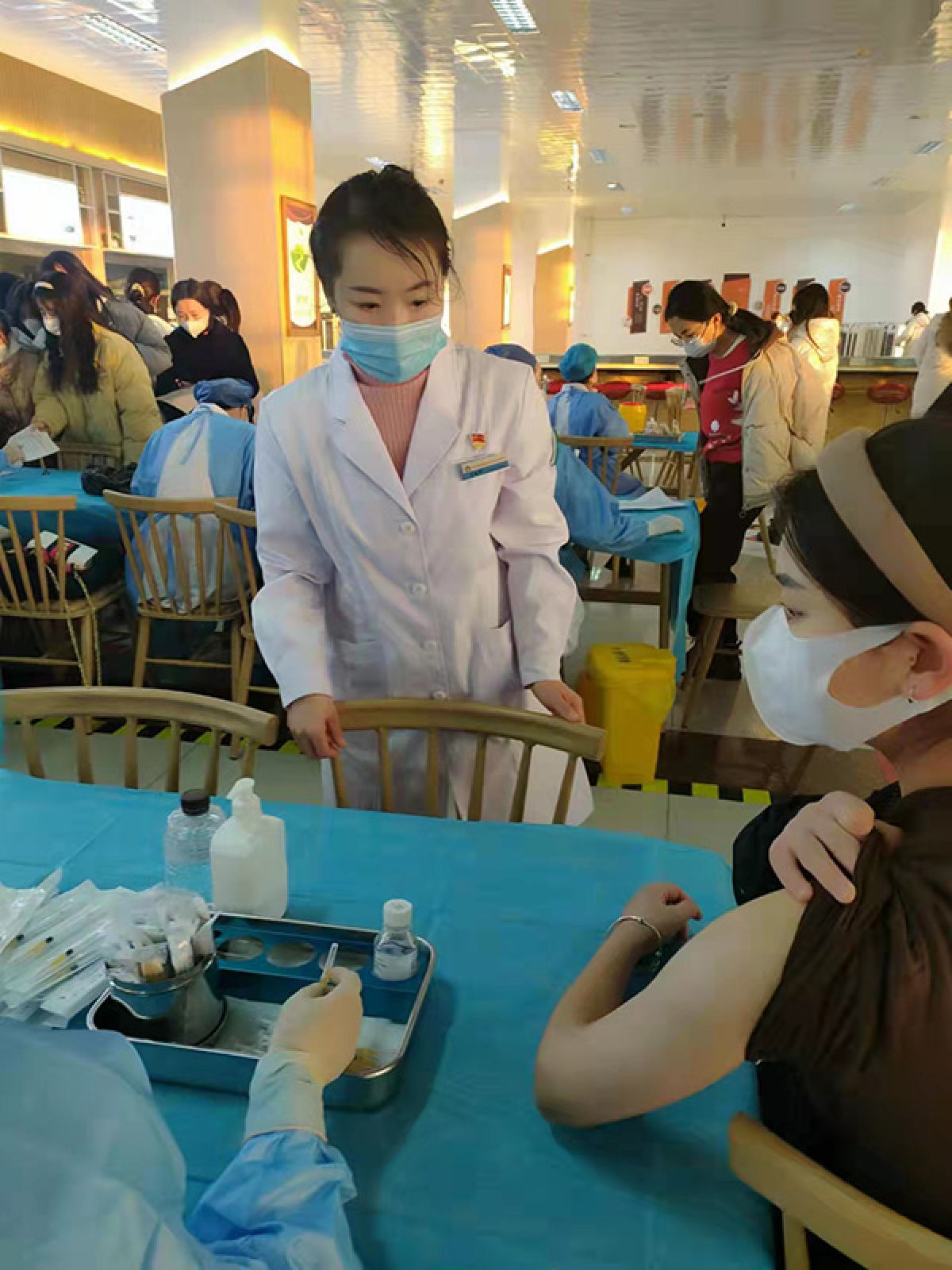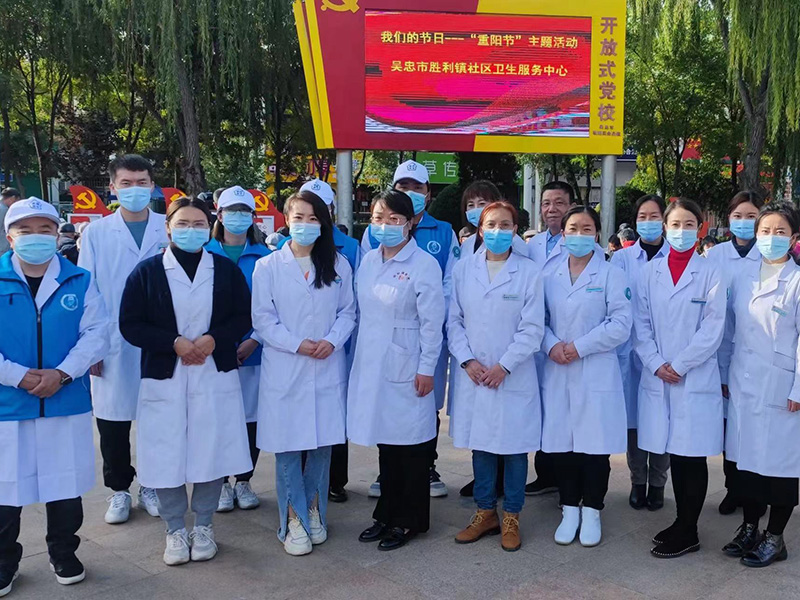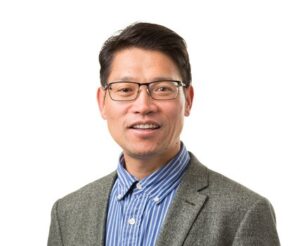Frontline Stories
A “White Angel” Goes the Extra Mile to Run 13 Service Stations of a Community Health Center in Wuzhong
As a girl, Wang Lina dreamt of becoming a “white angel,” of joining the ranks of health-care professionals distinguished by their white uniforms. Now 44, her only child away at university, she’s been living her dream for more than 12 years as a health-care worker at Shengli Township Community Health Center. It has 133 staff members and serves about 140,000 people. The health center is in Litong District, Wuzhong City, Ningxia Autonomous Region. Mrs. Wang is a popular community health leader.
It was on the eve of Chinese New Year that the health center called an emergency meeting. The coronavirus disease (COVID-19) outbreak had caught her and her colleagues by surprise. They panicked.
Fear gave way to resolve: they had to prevent and control the epidemic. Hesitation was not an option. Mrs. Wang and the health center staff worked 10-hour days. They were on standby. She couldn’t take a day off, not even weekends, and got 3 or 4 hours of sleep a night.
As more became known about COVID-19, fear gave way to resolve: they had to prevent and control the epidemic. Hesitation was not an option. From late January to mid-April 2020, Mrs. Wang and the community health center staff worked 10-hour days. They were on standby. She couldn’t take a day off, not even weekends, and got 3 or 4 hours of sleep a night. Her days were filled with taking phone calls, visiting residents, and coordinating the collection of polymerase chain reaction samples, whatever the time. Eight positive COVID-19 cases were confirmed in the city in 2020. It wasn’t put on strict lockdown but residents had to stay home. Mrs. Wang and her team taught them how to stay healthy, monitored their temperatures, quarantined anyone with a fever, provided psychological care to patients, among others.
The pressure was intense. Before the pandemic, Mrs. Wang managed community health service stations and developed, implemented, monitored, assessed, and reported on operations and business plans. During the pandemic, she also had to visit people at their homes to oversee their care. She helped the directors run all 13 service stations under the Shengli health center and coordinate the efforts of and communication between townships, township hospitals, neighborhood committees, and local police to ensure they worked together seamlessly. And she had to calm frightened residents and sort out their conflicts.
“My biggest challenge was psychological…. Anxiety is invisible. I want to conquer it.
But I can’t do it by myself.”
Tempers, Mrs. Wang said, sometimes flared at the beginning of the pandemic. “Gaps in procedures, incomplete information, inability to execute plans properly—all could give rise to complaints and anger.

People sometimes blamed each other,” she said. “I’m sure I sometimes hurt people who weren’t at fault.”
“My biggest challenge was psychological,” she admitted. She and her colleagues have mastered the work procedures and skills. But the problem, she said, was communication, collaboration, and psychological difficulties. Technical issues can be overcome with effort, study, and practice. “But anxiety is invisible,” she said. “I want to conquer it. But I can’t do it by myself. I’m cheerful and love to talk. I resolve conflict by constantly communicating. But I’m sometimes upset.”
She lamented the lack of psychological care services in Ningxia. “But our director is a visionary,” she said, “and he recruited Dr. Lianzhi Zhang, an expert in this area.”
The health center launched the city’s first counselling hotline. Dr. Zhang and her team have counselled more than 100 people and use Dingding and WeChat to train other counselors.

Mrs. Wang said she and other staff worry about infection. “But,” she added, “this is our job. We have adequate personal protection, so we don’t worry too much. Our medical staff constantly receive training. COVID-19 is terrible but it’s also preventable and controllable. None of us have come down with it.”
That’s not to say that they’ve stopped feeling fearful. “Faster-paced work, new variants such as omicron, increased transmissibility of the virus via aerosol transmission, for example,” Mrs. Wang counted the reasons. “They make us anxious all the time. I’m often restless and fidgety. The global pandemic is serious. High-speed rail transport has started between Xi’an and Wuzhong—just a 3-hour ride. We can’t be sure there won’t be infections among travelers. I’ve had insomnia since the pandemic started.”
Mrs. Wang lives alone and couldn’t see her mother and sister at the height of the pandemic for fear of infecting them. The worry was sometimes unbearable. She tried to shake it off by listening to music, hanging out with colleagues, or exercising before bedtime. But it was hard to stop thinking about her job. “I’m in charge of containing the pandemic,” she said, “and I have to lead public health and other projects. Some work was neglected. Leaders criticized us. I tried coping by myself but sometimes had to see Dr. Zhang. I might be fine for a day, then relapse because we need to work at breakneck speed the next day. I’m a perfectionist. I hope things will improve with age. Colleagues help take the load off when it’s too much.”
“We must show that when everyone follows the rules, we can better protect ourselves and others.”
“We work at the grassroots,” Mrs. Wang said. “Our experience might be different from that of frontliners in big cities. But we learned that while the disease is scary, it’s controllable.”
And the health center made sure to get its message across. “Our staff must be able to conduct health education among neighborhood committees, residents, and our own service stations,” she stressed. “We must show that when everyone follows the rules, we can better protect ourselves and others.”
Mrs. Wang’s biggest worry? “That the virus will constantly mutate and cause new outbreaks. But I have faith in our ability to battle the pandemic.”
Authors

Xuefeng Zhong
Interviewer and Public Health Specialist (Consultant)

Lin Li
Translator and Researcher (Consultant)


